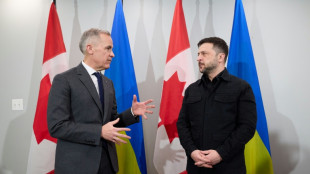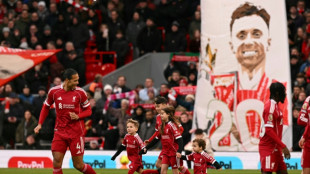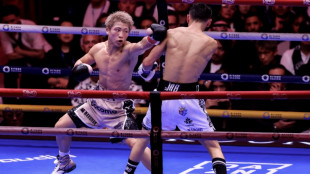
-
 Zelensky stops in Canada en route to US as Russia pummels Ukraine
Zelensky stops in Canada en route to US as Russia pummels Ukraine
-
Arteta salutes injury-hit Arsenal's survival spirit

-
 Wirtz scores first Liverpool goal as Anfield remembers Jota
Wirtz scores first Liverpool goal as Anfield remembers Jota
-
Mane rescues AFCON draw for Senegal against DR Congo

-
 Arsenal hold off surging Man City, Wirtz breaks Liverpool duck
Arsenal hold off surging Man City, Wirtz breaks Liverpool duck
-
Arsenal ignore injury woes to retain top spot with win over Brighton

-
 Sealed with a kiss: Guardiola revels in Cherki starring role
Sealed with a kiss: Guardiola revels in Cherki starring role
-
UK launches paid military gap-year scheme amid recruitment struggles

-
 Jota's children join tributes as Liverpool, Wolves pay respects
Jota's children join tributes as Liverpool, Wolves pay respects
-
'Tired' Inoue beats Picasso by unanimous decision to end gruelling year

-
 Thailand and Cambodia declare truce after weeks of clashes
Thailand and Cambodia declare truce after weeks of clashes
-
Netanyahu to meet Trump in US on Monday

-
 US strikes targeted IS militants, Lakurawa jihadists, Nigeria says
US strikes targeted IS militants, Lakurawa jihadists, Nigeria says
-
Cherki stars in Man City win at Forest

-
 Schwarz records maiden super-G success, Odermatt fourth
Schwarz records maiden super-G success, Odermatt fourth
-
Russia pummels Kyiv ahead of Zelensky's US visit

-
 Smith laments lack of runs after first Ashes home Test loss for 15 years
Smith laments lack of runs after first Ashes home Test loss for 15 years
-
Russian barrage on Kyiv kills one, leaves hundreds of thousands without power

-
 Stokes, Smith agree two-day Tests not a good look after MCG carnage
Stokes, Smith agree two-day Tests not a good look after MCG carnage
-
Stokes hails under-fire England's courage in 'really special' Test win

-
 What they said as England win 4th Ashes Test - reaction
What they said as England win 4th Ashes Test - reaction
-
Hong Kongers bid farewell to 'king of umbrellas'

-
 England snap 15-year losing streak to win chaotic 4th Ashes Test
England snap 15-year losing streak to win chaotic 4th Ashes Test
-
Thailand and Cambodia agree to 'immediate' ceasefire

-
 Closing 10-0 run lifts Bulls over 76ers while Pistons fall
Closing 10-0 run lifts Bulls over 76ers while Pistons fall
-
England 77-2 at tea, need 98 more to win chaotic 4th Ashes Test

-
 Somalia, African nations denounce Israeli recognition of Somaliland
Somalia, African nations denounce Israeli recognition of Somaliland
-
England need 175 to win chaotic 4th Ashes Test

-
 Cricket Australia boss says short Tests 'bad for business' after MCG carnage
Cricket Australia boss says short Tests 'bad for business' after MCG carnage
-
Russia lashes out at Zelensky ahead of new Trump talks on Ukraine plan

-
 Six Australia wickets fall as England fight back in 4th Ashes Test
Six Australia wickets fall as England fight back in 4th Ashes Test
-
Dental Implant Financing and Insurance Options in Georgetown, TX

-
 Man Utd made to 'suffer' for Newcastle win, says Amorim
Man Utd made to 'suffer' for Newcastle win, says Amorim
-
Morocco made to wait for Cup of Nations knockout place after Egypt advance

-
 Key NFL week has playoff spots, byes and seeds at stake
Key NFL week has playoff spots, byes and seeds at stake
-
Morocco forced to wait for AFCON knockout place after Mali draw

-
 Dorgu delivers winner for depleted Man Utd against Newcastle
Dorgu delivers winner for depleted Man Utd against Newcastle
-
US stocks edge lower from records as precious metals surge

-
 Somalia denounces Israeli recognition of Somaliland
Somalia denounces Israeli recognition of Somaliland
-
The Cure guitarist and keyboard player Perry Bamonte dies aged 65

-
 Draper to miss Australian Open
Draper to miss Australian Open
-
Police arrest suspect after man stabs 3 women in Paris metro

-
 Former Montpellier coach Gasset dies at 72
Former Montpellier coach Gasset dies at 72
-
Trump's Christmas gospel: bombs, blessings and blame

-
 Russia lashes out at Zelensky ahead of new Trump meeting on Ukraine plan
Russia lashes out at Zelensky ahead of new Trump meeting on Ukraine plan
-
Salah helps Egypt beat South Africa and book last-16 place

-
 Australia's Ikitau facing lengthy lay-off after shoulder injury
Australia's Ikitau facing lengthy lay-off after shoulder injury
-
Another 1,100 refugees cross into Mauritania from Mali: UN

-
 Guardiola proud of Man City players' response to weighty issues
Guardiola proud of Man City players' response to weighty issues
-
Deadly blast hits mosque in Alawite area of Syria's Homs


No longer a death sentence: Four decades of living with HIV
Forty years after the discovery of HIV, AFP looks at how far we have come in fighting a deadly virus that was once shrouded in fear and shame but is now treated as a manageable chronic condition.
- 1981: First alert -
In June 1981, US epidemiologists report five cases of a rare form of pneumonia in gay men in California.
It is the first alert about Acquired Immune Deficiency Syndrome (AIDS), still unknown and unnamed.
Doctors then identify "opportunistic infections" among intravenous drug users and in haemophiliacs and Haitian residents in the United States.
The term AIDS appears for the first time in 1982. The disease is wrongly presented as a "homosexual disorder".
- 1983: Identifying HIV -
In January 1983, researchers in France, Francoise Barre-Sinoussi and Jean-Claude Chermann, working under Luc Montagnier, identify the virus that "might be" responsible for AIDS.
Their discovery is published on May 20 in the journal Science.
The following year, US specialist Robert Gallo is said to have found the "probable" cause of AIDS, the retrovirus HTLV-III.
The two viruses turn out to be the same, and in May 1986 it becomes officially known as the Human Immunodeficiency Virus, or HIV.
- 1987: Anti-retroviral treatment -
In March 1987, the first anti-retroviral treatment known as AZT is authorised in the US. It is expensive and has severe side effects.
The United States and France agree that Gallo and Montagnier should get joint credit for discovering HIV. But the 2008 Nobel prize goes to Barre-Sinoussi and Montagnier.
- Early 1990s: Fallen stars -
In July 1985, US actor Rock Hudson announces he has AIDS. His death three months later is the first high-profile AIDS death.
A host of other stars succumb to the disease, including legendary pianist Liberace (February 1987), British singer and Queen frontman Freddie Mercury (November 1991), and the Russian dancer and choreographer Rudolf Nureyev (January 1993).
In 1994, AIDS becomes the leading cause of death among Americans aged between 25 and 44.
- 1995-96: New approach -
Two new classes of drugs signal the start of combinations of different anti-retroviral therapies.
Called tri-therapies, they provide the first effective treatment for HIV.
1996 is the first year in which the number of AIDS deaths declines in the United States. While US numbers decline, they rocket in Africa, where AIDS is the biggest killer by 1999.
- 2001: Generic medicine -
In 2000, UNAIDS and five major drug companies sign a deal to distribute affordable treatments in poorer countries.
A year later, the World Trade Organization changes intellectual property rules to allow developing countries to make generic versions of patent-protected HIV treatments.
In 2004, the country with the world's highest HIV caseload, South Africa, ends years of AIDS denialism and makes anti-retroviral treatments available through the public health system.
- 2010: First cure -
Timothy Ray Brown, an American man who had been living with HIV for over a decade, is cured of the virus after undergoing cancer treatment.
Brown underwent two bone marrow transplants containing a mutation of a gene that blocks HIV from attacking host cells.
- 2012: Preventive pill -
In July 2012, the first-ever daily pill to help prevent HIV infection is approved by US regulators. Truvada is a pre-exposure prophylaxis, or PrEP, taken by high-risk people who are HIV-negative in order to prevent them from being infected.
- 2017: Treatment spreads -
For the first time, more than half of all people living with HIV are receiving anti-retroviral treatment.
The proportion rises to three-quarters: 28.7 million people are being treated out of 38.4 million who are infected, according to UNAIDS in 2021.
- 2020-2021: Covid setback -
The Covid-19 pandemic disrupts access to health systems, testing and treatment, slowing progress in the fight against AIDS, which in 40 years has killed 40.1 million people.
In 2021, 650,000 AIDS deaths and 1.5 million new infections are recorded.
UNAIDS hopes to end AIDS as a public health threat by 2030.
A.Mahlangu--AMWN



